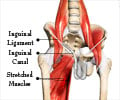FAQ's
1. Whom should we consult if we have symptoms of hernia?You can consult a General Surgeon or a Surgical Gastroenterologist.
2. What makes one suspect a Hernia?
A lump or swelling may be seen or felt in the groin or abdomen. If the swelling disappears when you lie down, there is probably a hernia. If it does not disappear, it may be trapped or incarcerated. You may feel discomfort, an ache, a pressure or pain in the area. The pain typically gets worse with prolonged standing or with heavy work.
3. What is the most common type of hernia?
The most common type of hernia is called an inguinal hernia. It can be present at birth or develop over the years.
4. What does inguinal mean?
For the most part this means the groin area. Inguinal hernias can also be called groin hernias.
5. Do only men get hernias?
Although nearly 80 percent of people who experience hernias are men, anyone can get them. Women whose abdominal muscles have been weakened from childbirth are particularly susceptible. Even a newborn can have a hernia if his abdominal muscles haven't developed properly.
6. Femoral hernia occurs commonly in men or women?
Usually women are more prone to Femoral Hernias through the femoral canal and this maybe due to their wider pelvis.
7. What can happen to a Hernia?
A hernia does not get better and cannot be healed by medicines. If left untreated, it will gradually get worse, and become larger. Severe pain may indicate 'trapping' or incarceration, or strangulation of intestines, which may require emergency surgery.
8. What's the treatment for a hernia?
A common myth is that limiting activities and getting plenty of rest can cure a hernia. While this will certainly alleviate symptoms, surgery is the only way to repair a hernia. Since neglecting a hernia can have serious consequences, consult with your doctor about the best course of treatment.


















